笔译人称与物称-
英汉主语差异研究---“物称”与“人称”

英汉主语差异研究---“物称”与“人称”摘要:英语句子较常用物称表达法,表达客观事物如何作用于人的感知,让事件以客观的口吻进行呈现,相较之,汉语句子常用人称表达法,常从自我出发来叙述客观事物。
本文对比分析英汉两种语言不同的主语选择倾向,并指出在英汉互译过程中应综合考虑各方面因素,以确保译文既符合译入语读者阅读习惯,又保持原文的表现力。
关键词:物称,人称,有灵主语,无灵主语,翻译策略一、汉英主语特点对比及原因分析句子的主语可以分为“物称主语”(impersonal subject)和“人称主语”( personal subject)两种类型。
所谓“物称主语”,即句子的主语是“物”;所谓“人称主语”,即句子的主语是“人”。
以“物”为主语的句子称为“物称主语句”;以“人”为主语的句子称为“人称主语句”。
英语主语倾向于物称化表达,常选择不能施行动作或无生命事物的词语做主语,而汉语主语则更习惯于人称化的表达,能施行动作或有生命的物体是主语之首选。
从有无生命角度划分,句子主语可分为有灵主语和无灵主语。
有灵主语是有生命特征的事物名称充当主语,如:student, teacher, doctor等。
无灵主语是无生命的事物或表示概念的抽象名词所充当的名词,如:sight, success,darkness等。
英语的物称倾向反映了西方人的客体意识。
古希腊哲学家亚里士多德所开创的形式逻辑和盛行于16至18世纪欧洲的理性主义对英语产生了深远的影响。
西方人善于用逻辑和理性思维进行思考,同时,他们推崇自然,认为自然是人类认知的主要对象,必须充分认识自然、了解自然、自然和人类同等重要。
与之相比,汉语的人称倾向反映了汉语较注重主体思维,往往从自我出发来叙述客观事物,或倾向于描述人及行为或状态。
中国人相信“天人合一(oneness between manand nature)”,强调“事在人为”、“以人为本”。
中国文化传统意义上的这种人本文化的长期积淀,形成了汉民族主体型的思维方式,即以人文为中心来观察、分析、推理和研究事物的思维。
句子翻译物称和人称共26页文档

物称和人称

2 用作虚义词,代替的主语是难以言 表的现象或情形,用以表示自然现象 、时间、空间以及惯用语之中。 How is it with the sick man?
3 用作强调词,应到所需要的成分, 也是一种形式主语。 It is a good horse that never stumbles.
2. 转化非人称主语,把英语的简单句和复 杂句拆成汉语的并列句或流水句。
1) Her weariness and the increasing heat determined him to sit down in the first convening shade.他疲惫不堪,天气也越来越热,他决意一遇到个近 便的阴凉处,就坐下来休息。
信息中心位置,从而突显物称倾向。
汉语在无确定人称时,采用如有人,人们, 别人,大家等泛称或无主句,从而突显人称
倾向。
1)用作先行词代替真正的主语或宾语。 It never occurred to me that she was so dishonest. 我从来没想过她会这么不老实。
2)用作虚意词,代替的主语是难以言明的现象或者情形,如用以 表示自然现象、时间、空间以及惯用语中。 How is it with the sick man ? 那个病人怎么样了?
3. 把非人称代词主语句换成汉语的的无主句或主 语泛称句。
1) The mastery of a language requires painstaking efforts. 要掌握一门语言,必须下功夫。
2) A little flattery will fetch him. 稍一奉承就会把她迷惑住了。
4) A lack of information and formal educational training had left many persons without any generalized standards of judgment applicable to this novel situation.
笔译笔记整理
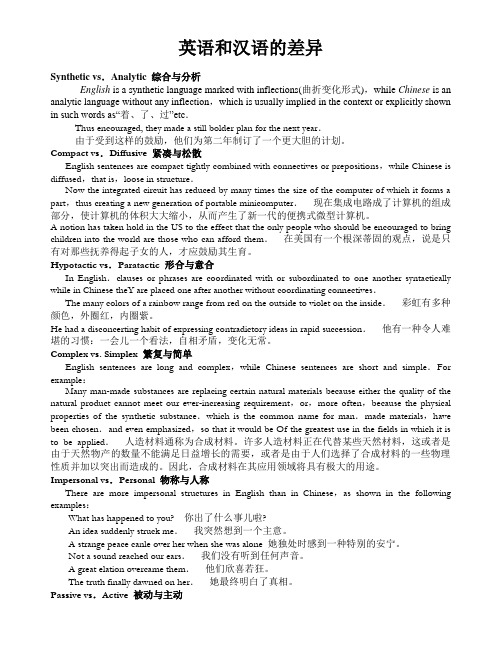
英语和汉语的差异Synthetic vs.Analytic 综合与分析English is a synthetic language marked with inflections(曲折变化形式),while Chinese is an analytic language without any inflection,which is usually implied in the context or explicitly shown in such words as“着、了、过”etc.Thus encouraged, they made a still bolder plan for the next year.由于受到这样的鼓励,他们为第二年制订了一个更大胆的计划。
Compact vs.Diffusive 紧凑与松散English sentences are compact tightly combined with connectives or prepositions,while Chinese is diffused,that is,loose in structure.Now the integrated circuit has reduced by many times the size of the computer of which it forms a part,thus creating a new generation of portable minicomputer.现在集成电路成了计算机的组成部分,使计算机的体积大大缩小,从而产生了新一代的便携式微型计算机。
A notion has taken hold in the US to the effect that the only people who should be encouraged to bring children into the world are those who can afford them.在美国有一个根深蒂固的观点,说是只有对那些抚养得起子女的人,才应鼓励其生育。
汉英笔译基础教程 第6章 人称与物称

6.1汉语的人称倾向
❖汉语“无灵主语”与“有灵动词”搭配通常用作 一种修辞手段——拟人化,如 “什么风把你吹来 的”, “爱情把我们的心连在一起”, “高山低 头,河水让路”。
❖ 例4.北京目睹过许多伟大的历史事件。 ❖Beijing has witnessed many great
白:自从我睡着以后,太阳一走了很长的路了。 ❖ My hunger and the shadows
together tell me that the sun has done much travel since I fell asleep.
6.2 英语的物称倾向
❖3.表见闻的the sight, the thought等构成的 物称:
❖ 例15.想起辛酸的往事,奶奶就悲伤不已。 ❖ The thought of bitter past
overwhelmed my grandma with grief. ❖ 4.可以是时间、具体地点、人生阶段: ❖例16. 那个寒冷的下午,他独自在雪地里跋涉。 ❖ The chilly afternoon found him
unprofitable large and medium-sized State enterprises from their predicament.
6.1汉语的人称倾向
❖ 例9.一死了百债。(无主句) ❖ Death pays all debt. ❖ 例10.大街小巷早就传遍了各种流言蜚语。 ❖ Rumors had already spread along
wwwthemegallerycom63汉英翻译中的人称向物称的转换633运用非人称代词it来翻译用it作形式主语或形式宾语替代逻辑主语或逻辑宾语尤其是泛指人称句的翻译
笔译-英汉差异
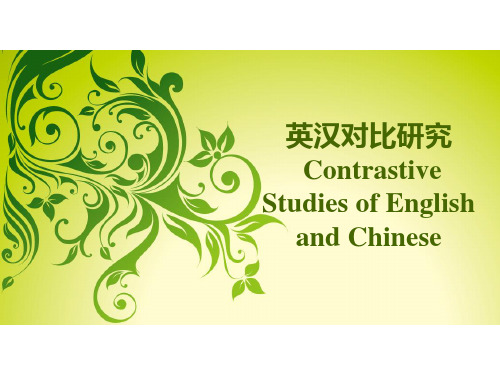
上篇 :英汉语言文化 2. Rigid vs. Supple (刚性与柔性) 英语:刚性 3. 基本句型的扩展 定、状、宾、主、补、同位语等
Ex.
Jack painted the door green.
上篇 :英汉语言文化 2. Rigid vs. Supple (刚性与柔性) 英语:刚性 4. 基本句型的组合 S+C (clause): compound & complex(并列、因 果、转折、让步、条件等) Ex. Jack painted the door green…
上篇 :英汉语言文化 1. Synthetic vs. Analytic
(综合语与分析语) Exercises 7. 我想起来了。 I’ll get up. I’ve thought it out. 虚词 助词 “起来”重读
“起来”轻读
8. I saw Mary in the garden. 我在公园里看见玛丽。 我看见玛丽在公园里。
那是个天气晴朗、金黄可爱的秋天,美好的秋色 为那些青年们送别。待到战后和平时期,黄叶纷飞 的秋天再度来临时,当日的青年已经失去了青春, 有的甚至丧失了生命。
1.基本句型结构 S+V: The telephone rang. S+V+P: We are students. S+V+O: Labor created man. S+V+o+O: She sang us a song. S+V+O+C: We elected him our monitor.
上篇 :英汉语言文化 2. Rigid vs. Supple (刚性与柔性) 英语:刚性 2. 基本句型的变式 陈述句 Jack painted the door green. 否定句 Jack didn’t paint the door green. 疑问句 Did Jack paint the door green? The door was painted green by John.
英汉互译技巧

2. But for many, the fact that poor people are able to support themselves almost as well without government aid as they did with it is in itself a huge victory. (ibid) [译文] 但是对于许多人来讲,穷人能够在不用政府援救的 条件下也像是有政府帮助那样自己养活自己这一事实本 身就已经证明了它是一个巨大的胜利。(1.增译法, 2.同 位语译法,3.词性转换) 3.But we must bear in mind that the great proportion of books, plays and films which become before the censor are very far from being “works of art”. (四级模 拟题) [译文]可是我们要牢记送到审读员面前的大量书刊、戏剧 和电影远非“杰作”。(正-反翻译法) 4. We are taught that a business letter should be written in a formal style rather than in a personal one. (四级模 拟题) [译文]老师教我们,公函要以正式文体书写,而不应以私 人信函的文体来书写。(正-反翻译法)
翻译的技巧
英汉翻译技巧是为了解决“懂”与“会”之间的 关系,也就是说怎样处理好“学”与“用”的关 “ “ 系,使我们能够通过学习,掌握一般的英汉翻译 技巧,将学到的翻译知识自觉地用于翻译实践。 翻译是一门实践性很强的学问,需要长期下苦功 夫才能真正学到手。所以译者的翻译能力不能单 靠学习理论知识、强化技巧训练,而是需要扎扎 实实的双语功底及大量的翻译实践。
英汉汉英口笔译常识(句法对比)

从属与并列 ( subordinate vs. Coordinate )
The doorway lay at least 12 umbrellas of all sizes and colors. 门口放着一堆雨伞,少说也有12把, 五颜六色,大小不一。 There are many wonderful stories to tell about the places I visited and the people I met. 我访问了一些地方,遇到了不少人。 要谈起来,奇妙的事儿可多着呢。
4
静态与动态 ( Static vs. Dynamic )
I am afraid of your misunderstanding me. 我担心 担心你会误解 误解我。 担心 误解 Rockets have found application for the exploration of the universe. 火箭已经用来探索 用来探索宇宙。 用来探索 I used to be a bit of a fancier myself. 过去我也常常有点胡思乱想 胡思乱想。 胡思乱想
11
2.英语被动句译为汉语主动句。 英语被动句译为汉语主动句。
The glass is broken. 玻璃杯破了。 The house is surrounded by trees. 房子周围都是树。 Last night I was covered up with two quilts. 昨晚我盖了两条被子。
18
Thank you!
Байду номын сангаас
19
20
14
4.英语被动句译成汉语无主句。 英语被动句译成汉语无主句。
论人称与物称的汉英转换--以商务英语翻译为例

论人称与物称的汉英转换--以商务英语翻译为例李太志【摘要】Personal subject is an obvious feature in Chinese while impersonal subject is an outstanding characteristic in English .As a result , the personal subject in Chinese is often transferred into impersonal subject in English translation .Contrastive analysis of the differences be-tween Chinese and English in the use of personal and impersonal subject shows that this transfer is more common and necessary in formal -style BE translation .%汉语多用有生命的词语作句子的主语,并较多地使用拟人手法,行为主体或句子主语常常由人或以人为本的机构来担当。
这就是汉语突出人称的句法修辞倾向。
与汉语不同的英语句法修辞特点之一就是物称主语,也就是以抽象名词和物质名词作为主语的句法修辞特征。
在文体正式的商务英语中,这种句法修辞倾向就更明显。
对比分析汉英两种语言之间的这一差异,对于我们英译来说,有着重要的启示与警示。
【期刊名称】《广东石油化工学院学报》【年(卷),期】2014(000)002【总页数】3页(P41-43)【关键词】商务英语翻译;汉语人称;英语物称;汉英转换【作者】李太志【作者单位】广东石油化工学院外国语学院,广东茂名525000【正文语种】中文【中图分类】H315.9在《英语交际语法》(1974)一书中,利奇(G.Leech)和斯瓦特威克(J.Svartvik)指出:“Formal written language often goes with an impersonal style;i.e.one in which the speaker does not refer directly to himself or his readers,but avoids the pronouns I,you,we.Some of the common features of impersonal language are passives,sentences beginning with it,and abstract nouns.”[1]钱歌川在《英语疑难详解》(1978)中说:“我们说中文时,惯常都要用人或生物做主语,而英文则爱用无生物做主语。
英译汉物称与人称
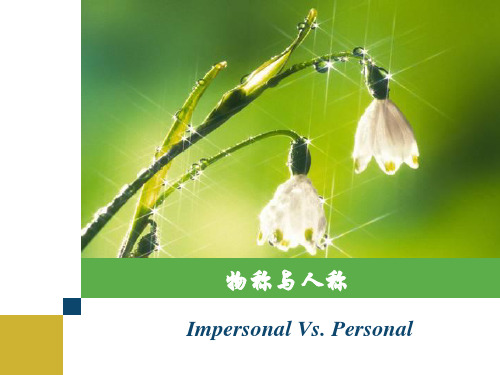
It was surprising that I met her that time. The year of 1949 witnessed this accident.
2
It has been noted with concern that the stock of books in the library has been declining alarmingly. Students are asked to remind themselves of the rules for the borrowing and return of books, and to bear in mind the needs of other students. Penalties for overdue books will in the future be strictly enforced. 近来本馆的图书大量减少,数目惊人,我们对此 表示极为关切。现请学生们切勿忘记借还规则, 并考虑其他同学的需要。今后凡借书逾期不还者, 必将严格按章处罚。
16
五四运动以后,开始了“新红学时代”,代 表人物有胡适、俞平伯等一些学者。 The May Fourth Movement of 1919 saw the beginning of the New Redology, represented by such scholars as Hu Shi and Yu Pingbai.
11
汉语思维习惯:很少使用无灵主语,只有在 拟人修辞时使用无灵主语。
北京目睹过许多伟大的历史事件。 星光很早以前就踏上了旅程。 Beijing has witnessed many historical events. The light from the stars started on its journey long long ago.
第5章 物称与人称(英汉对比研究)
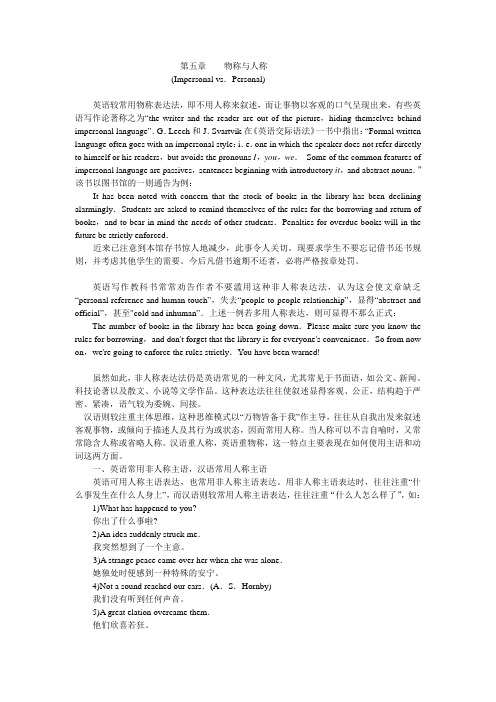
第五章物称与人称(Impersonal vs.Personal)英语较常用物称表达法,即不用人称来叙述,而让事物以客观的口气呈现出来,有些英语写作论著称之为“the writer and the reader are out of the picture,hiding themselves behind impersonal language”.G.Leech和J.Svartvik在《英语交际语法》一书中指出:“Formal written language often goes with an impersonal style:i.e.one in which the speaker does not refer directly to himself or his readers,but avoids the pronouns I,you,we.Some of the common features of impersonal language are passives,sentences beginning with introductory it,and abstract nouns.”该书以图书馆的一则通告为例:It has been noted with concern that the stock of books in the library has been declining alarmingly.Students are asked to remind themselves of the rules for the borrowing and return of books,and to bear in mind the needs of other students.Penalties for overdue books will in the future be strictly enforced.近来已注意到本馆存书惊人地减少,此事令人关切。
汉英差异 物称与人称

• 1.2无灵主语与有灵主语 • 从有无生命角度划分,主语可区分为有灵 主语和无灵主语两类。有灵主语是有生命 特征的事物名称充当主语,例如:student, teacher, doctor等。无灵主语是无生命的事 物或表示概念的抽象名词所充当的名词,例 如:sight, success, darkness等。 • 有灵动词是指用来表示有生命特征的事物 的那种动作,例如:speak, say, cry, write等。无 灵动词则是指用来描写无生命特征事物的 动作、作用、变化等的那类动词,例如:rise, fall, move, cover等。
敲了敲门。
*A few moment brought them to a cottage door, at
which the owner knocked.
*④北京目睹过许多伟大的历史事件。 *Beijing has witnessed many great historical events.
*(3)具体事物作主语。 *⑤我们迎着朝阳来到甲板上。 * The morning sun greeted us as we came out on the deck. *⑥他收到一份紧急电报,匆匆去了洛杉矶。 * An urgent telegraph hurried him to Los Angeles. *(4)具有动词意味的名词作主语。 *⑦(人们)发现新物种后就可以研制新药。 * The discovery of new species will lead to new drugs. *⑧他想起这些,便会增加生活的热情。 *The remembrance of these will add zest to his life.
*2.2英语用“it”作主语,如it is believed,it is thought等,往往
人称与物称 by group 4
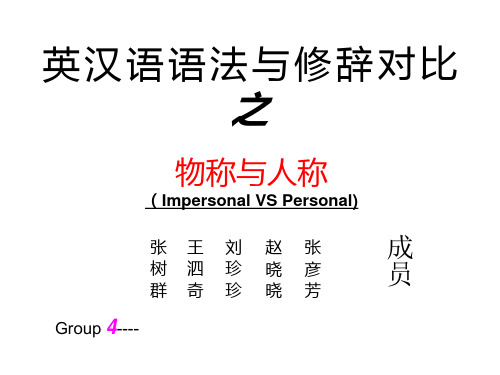
• 汉语中,没有 作主语的非人称被动式,多以主 汉语中,没有it作主语的非人称被动式 作主语的非人称被动式, 动的形式表达被动的意义。
英汉语语法与修辞对比
之
物称与人称
(Impersonal VS Personal) 张 树 群 奇 泗 珍 晓 芳 王 珍 晓 彦 刘 赵 张
成 员
Group 4----
Introduction
• 英语较常用物称表达法,,让事物以客观 英语较常用物称表达法,,让事物以客观 较常用物称表达法,,让事物以 的口气呈现出来, 的口气呈现出来,“the writer and the reader are out of the picture ,hiding themselves behind the impersonal language ”,这样显得客观公正,结构严 ,这样显得客观公正, 语气委婉。 密,语气委婉。 • 汉语较重主体思维,以“万物皆备于我” 汉语较重主体思维, 较重主体思维 万物皆备于我” 为主导,从自我出发来叙述事物 来叙述事物。 为主导,从自我出发来叙述事物。
有灵动词
突显拟人化修辞色彩, 语气含蓄,反应英美 民族的幽默感。
汉人缺乏幽默感,往往用人 或比较确定的事物作主语。 Back
一、英语中非人称作主语,汉语常用人称作主语 英语中非人称作主语,
2、用&填补词)
用作先行词(preparatory “it )代替真正的主语或宾语 用作先行词( it”) 先行词 it It never occurred to me that she was so dishonest . 我从来都没有想到她这么不老实 。 He made it clear that he wouldn’t take the job . 他明确表示不会接受这份工作。 用作虚义词( 用作虚义词(unspecified “it”) 难以言明的现象或情形 虚义词 ) 自然现象、时间、空间以及惯用语中) (自然现象、时间、空间以及惯用语中) It has been two years since I began to work here . 我在这工作两年啦。 It’s easy to find a stick to beat a dog . 欲加之罪何患无词。
语言对比与翻译 物称与人称(9) 共31页PPT资料
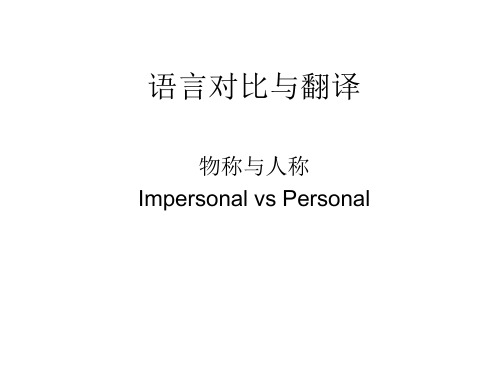
总之,汉语重人称,英语重物称,主要表现 在如何使用主语和动词上。
英语物称与汉语人称:翻译转换
1.英语常用非人称主语,汉语常用人称主语 英语可用人称主语,也常用非人称主语表达。用后
2)Impersonal: Applicants for these positions must fill forms by August 1.
Human: Please apply by August1.
3) Impersonal: The enclosed form from the accounting department has been sent for your signature.
者表达时,常注重“什么事发生在什么人身上”。 汉语则较常用人称主语表达,较注重“什么人怎么
样了”。如:
1)What has happened to you? 你出了什么事啦? 2)An idea suddenly struck me. 我突然想到了一个主意。
3)A strange peace came over her when she was alone.
• 试比较: 1)Impersonal: It waபைடு நூலகம் noted that this office did not
reply to the letter of July 22. Please be advised that apologies are hereby tendered.
Human: We sincerely apologize for not replying to your July 22 letter.
笔译基础语法知识点总结

笔译基础语法知识点总结一、名词名词是表示人、事物、地点、状态等概念的词类,是语言中最基本的词类之一。
在笔译中,正确理解和运用名词的语法知识对于保持原文意思的准确性至关重要。
以下是名词的一些语法知识点:1. 单数与复数形式名词有单数和复数两种形式,单数表示一个,复数表示多个。
在英语中,一般在名词后加-s或-es来表示复数形式,但也有一些不规则的变化规则需要注意。
2. 可数名词与不可数名词可数名词是指可以用来计算数量或者有单复数变化的名词,如book(书)- books(书籍),而不可数名词则是指无法用于单复数变化或者表示不可数的名词,如water(水),其中water是不可数名词,无法用于单复数变化。
3. 特殊名词一些名词在变为复数形式时存在不规则的变化,例如:man(男人)-men(男人们),woman(女人)-women(女人们)等。
4. 名词所有格在表示所有关系时,名词需要用' s 或者 of 来表示,如:the boy's book(男孩的书), the book of the boy(男孩的书)5. 名词修饰名词可以被定语修饰,通常和名词放在一起的词类包括:形容词、副词、介词短语等。
二、动词动词是句子中最重要的一类词,它可以表示行为或状态。
在笔译中,正确理解和使用动词的语法知识对于保持原文意思的准确性至关重要。
以下是动词的一些语法知识点:1. 时态动词的时态表示动作或状态发生的时间,有一般现在时、一般过去时、一般将来时等。
在笔译中,要根据上下文准确使用时态,确保译文的准确性。
2. 语态动词的语态包括主动语态和被动语态。
在笔译中,要根据上下文准确使用语态,使译文表达出原文的含义。
3. 情态动词情态动词包括can, could, may, might, must等,用来表示情态的语气。
在笔译中,情态动词的使用要根据上下文准确进行翻译,以保持原文的逻辑连贯性。
4. 动词时态和语态的转换在笔译中,动词时态和语态的转换常常涉及到句子结构和语法规则的变化。
语言对比和翻译物称和人称

3)The happiness---the superior advantages of the young women round about her, gave Rebecca inexpressible pangs of envy. (W. Thackeray: Vanity Fair)
丽贝卡看见她周围旳小姐那么福气,享有种种优越 旳权利,却有说不出旳眼红。
• 以图书馆旳一则通告为例:
It has been noted with concern that the stock of books in the library has been declining alarmingly. Students are asked to remind themselves of the rules for the borrowing and return of books, and to bear in mind the needs of other students. Penalties for overdue books will in the future be strictly enforced.
• The number of books in the library has been going down. Please make sure you know the rules for borrowing, and don’t forget that the library is for everyone’s convenience. So from now on, we’re going to enforce the rules strictly. You have been warned.
句子翻译——物称与人称

不过,汉语中的这种类型的句子,同样不是绝对必须用英语 被动式来处理的。
汉语主动句的英译问题
汉语多采用主动语态,但在英译时有时改用被动语态。语 态的变换基于多种原因,概括起来说,主要是:
(一) 为了强调接受动作的人或事物的重要性 英语里常常运用被动结构把动作的承受者作为句子里的主语, 来突出它的地位,强调它的重要性。由于这个原因,汉译英 时,往往将汉语的主动句变换 为英语的被动句,把原文的宾 语变成译文中的主语。例如: 我国各族人民每年都要热烈庆祝十月一日的国庆节。 National Day is enthusiastically celebrated on Oct. 1 by the Chinese people of all nationalities every year. 他提议在各班之间开展友谊竞赛。 He proposed that a friendly emulation drive be started among the different classes.
常用被动语态的文体
这类信息性的文体主要指科技文体、新闻 文体、公文文体及论述文体。科技论文注 重事理和活动的客观叙述(impersonal activity seen objectively),力戒作者的主观 臆断,因而常常避免提及施事。新闻报道 注重口气客观、间接,叙事翔实、冷静 (calm fact-teller),施事往往难以言明,也 不宜言明。公文则注重叙述公正、无私, 口气客观、正式。英语有过分使用被动语 态的倾向。正式文体尤其如此。
英汉被动句式结构的差异
尽管英语的被动意义有时可以不用被动式 来表达,但总的说来,
英语常用结构被动式,少用意义被动 式。与此相反,汉语则常用意义被动 式,少用结构被动式。
- 1、下载文档前请自行甄别文档内容的完整性,平台不提供额外的编辑、内容补充、找答案等附加服务。
- 2、"仅部分预览"的文档,不可在线预览部分如存在完整性等问题,可反馈申请退款(可完整预览的文档不适用该条件!)。
- 3、如文档侵犯您的权益,请联系客服反馈,我们会尽快为您处理(人工客服工作时间:9:00-18:30)。
Impersonal vs. Personal (物称与人称)(主语)
English: impersonal. Formal written language often goes with an impersonal style; i.e. one in which the speaker does not refer directly to himself of his readers, but avoids the
pronouns I, you we. Some of the common features of impersonal language are passives,
sentences beginning with introductory it, and abstract nouns.
Chinese: personal. 汉语较注重主体思维,这种思维模式以“万物皆备于我”作主导,往往从自我出发来叙述客观事物,或倾向于描述人及其行为和状态,因而常用人称。
当人称可以不言自喻时,又常常隐含人称或省略人称。
A. 英语用非人称作主语的句子大体可以分为以下两类:
1. 采用“无灵主语”(inanimate subject)表示抽象概念、心理感觉、事物名称或时间地点等,
但谓语却常常使用“有灵动词”(animate verb),表示人或社会团体的动作和行为,如see, find, bring, give escape, surround, kill, deprive, seize, send, know, tell, permit, invite, take, drive, prevent…from等。
汉语的“有灵动词”一般只能与人称搭配。
汉语往往用人或比较确定的事物作主语。
a.An idea suddenly struck me.
b. A strange peace came over her when she was alone.
c. A great elation overcame them.
d.From the moment we stepped into the People’s Republic of China, care and kindness
surrounded us on every side.
2. 用非人称代词“it”作主语;汉语常用人称,或省略人称,或采用无主句。
a.用作先行词(preparatory “it”), 代替真正的主语或宾语(“to represent a whole group of
words which it would not be convenient to put in the place required by the ordinary rules of word-order without causing ambiguity or obscurity”)
It never occurred to me that she was so dishonest.
b.用作虚义词(unspecified “it”), 代替的主语是难以言明的现象或情形,如用以表示自然现
象、时间、空间以及惯用语中
How is it with the sick man?
It’s windy today.
c.用作强调词(emphatic “it”)
It is in the hour of trial that a man finds his true profession. (B. Shaw)
It is a good horse that never tumbles. (proverb)
d.英语的“there be”句式以及不定代词“one”作主语的句子也有非人称倾向.
One must be a servant before one can be a master. (proverb)
B.英语常用被动式,采用物称表达法;汉语常用主动式,采用人称、泛称或隐称表达法。
A current search of the files indicates that the letter is no longer in this Bureau’s possession. It is noted that the letter was received two months ago and after study, returned to your office. In view of the foregoing, it is regretted that your office has no record of its receipt. If the letter is found, it would be appreciated if this Bureau was notified at once.
家庭作业:
1. Excitement deprived me of all power of utterance.
2. The thick carpet killed the sound of my footsteps.
3. The forty years, 1840-80, brought almost ten million migrants to America.
4. The little chap’s good-natured honest face won his way for him.
5. Friday started with a morning visit to the modern campus of the 22,000-student University
of Michigan in nearby Ann Arbor, where the Chinese table tennis team joined students in the cafeteria line for lunch and later played an exhibition match.
6. It is a long lane that has no turning.
7. It is an ill bird that fouls its own nest.
8. It is an ill wind that blows nobody well.
9. It is a wise man that never blunders./Even homer nods。
